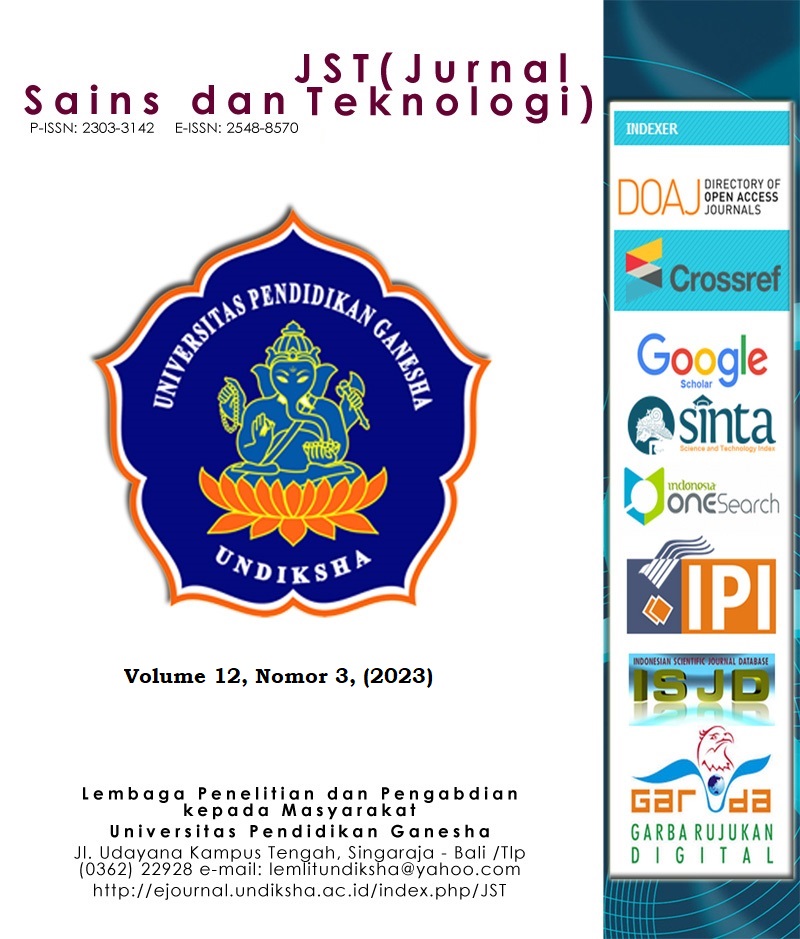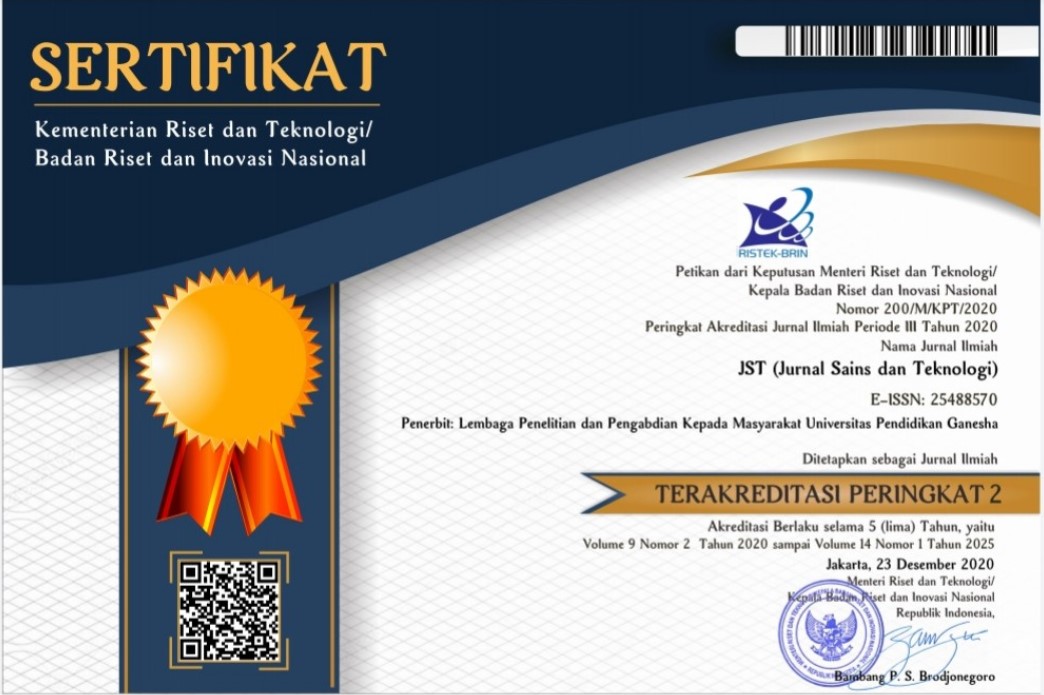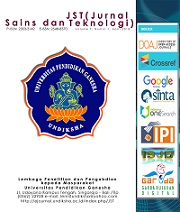Positive Impact of Using Learning Management Systems in the Higher Education Level
DOI:
https://doi.org/10.23887/jstundiksha.v12i3.69808Keywords:
Learning Management Systems, LMS Difficulties, Higher EducationAbstract
Almost all universities in urban areas already use Learning Management Systems (LMS). This obligation forces lecturers to prepare material and put it into Learning Management Systems (LMS). But facts. There are 63% of lecturers who have difficulty compiling online material. The hope is that using Learning Management Systems (LMS) can improve student learning outcomes. This research aims to determine the positive impact of implementing learning in higher education assisted by Learning Management Systems (LMS). The research wants to find out the obstacles and difficulties in implementing Learning Management Systems (LMS) learning. The research method used is a survey by distributing instruments. Data collection technique, by distributing instruments to 132 people consisting of lecturers and students who were directly involved in the learning process. The analysis technique averages the instruments that have been assessed by students and lecturers. The average results are then interpreted into sentences. As a result, lecturers find obstacles and difficulties in using the learning management system in the learning process. Obstacles and difficulties lie in the implementation of material, the use of learning models, and difficulties in assessing student attitudes and skills. It was found that the material was not included in the Learning Management Systems (LMS) but still distributed different media materials so that learning was less effective. Assessment indicators are also not given to students, so students cannot measure their abilities. In conclusion, every lecturer must prepare materials, models, and assessment instruments before using Learning Management Systems (LMS) as a tool to help implement learning in higher education.
References
Abd. Syakur, Sugirin, & Widiarni. (2020). The Effectiveness of English Learning Media through Google Classroom in Higher Education. Britain International of Linguistics Arts and Education (BIoLAE) Journal, 2(1), 475–483. https://doi.org/10.33258/biolae.v2i1.218.
Adebayo, T. S., Agyekum, E. B., Altuntaş, M., Khudoyqulov, S., Zawbaa, H. M., & Kamel, S. (2022). Does information and communication technology impede environmental degradation? fresh insights from non-parametric approaches. Heliyon, 8(3), 1-13. https://doi.org/10.1016/j.heliyon.2022.e09108.
Akeed, M. H., Qaidi, S., Ahmed, H. U., Faraj, R. H., Mohammed, A. S., Emad, W., Tayeh, B. A., & Azevedo, A. R. G. (2022). Ultra-high-performance fiber-reinforced concrete. Part IV: Durability properties, cost assessment, applications, and challenges. Case Studies in Construction Materials, 17(May), e01271.1-20. https://doi.org/10.1016/j.cscm.2022.e01271.
Al-Mamary, Y. H. S. (2022). Understanding the use of learning management systems by undergraduate university students using the UTAUT model: Credible evidence from Saudi Arabia. International Journal of Information Management Data Insights, 2(2), 1-11. https://doi.org/10.1016/j.jjimei.2022.100092.
Alturki, U., & Aldraiweesh, A. (2021). Application of learning management system (Lms) during the covid-19 pandemic: A sustainable acceptance model of the expansion technology approach. Sustainability (Switzerland), 13(19), 1-16. https://doi.org/10.3390/su131910991.
Anthony Jnr, B. (2020). Examining the role of green IT/IS innovation in collaborative enterprise-implications in an emerging economy. Technology in Society, 62(June), 101301.1-15. https://doi.org/10.1016/j.techsoc.2020.101301.
Ariono, B., Wasesa, M., & Dhewanto, W. (2022). The Drivers, Barriers, and Enablers of Building Information Modeling (BIM) Innovation in Developing Countries: Insights from Systematic Literature Review and Comparative Analysis. Buildings, 12(11), 1-22. https://doi.org/10.3390/buildings12111912.
Asamoah, M. K. (2021). ICT officials’ opinion on deploying Open Source Learning Management System for teaching and learning in universities in a developing society. E-Learning and Digital Media, 18(1), 18–38. https://doi.org/10.1177/2042753020946280.
Assen, J. H. E., & Otting, H. (2022). Teachers’ collective learning: To what extent do facilitators stimulate the use of social context, theory, and practice as sources for learning? Teaching and Teacher Education, 114(6), 103702.1-11. https://doi.org/10.1016/j.tate.2022.103702.
Behera, R. K., Bala, P. K., Rana, N. P., & Kayal, G. (2022). Self-promotion and online shaming during COVID-19: A toxic combination. International Journal of Information Management Data Insights, 2(2), 100117.1-15. https://doi.org/10.1016/j.jjimei.2022.100117.
Degner, M., Moser, S., & Lewalter, D. (2022). Digital media in institutional informal learning places: A systematic literature review. Computers and Education Open, 3(December 2021), 100068.1-11. https://doi.org/10.1016/j.caeo.2021.100068.
Díez, F., Villa, A., López, A. L., & Iraurgi, I. (2020). Impact of quality management systems in the performance of educational centers: educational policies and management processes. Heliyon, 6(4), 1-7. https://doi.org/10.1016/j.heliyon.2020.e03824.
Duan, L., Shao, X., Wang, Y., Huang, Y., Miao, J., Yang, X., & Zhu, G. (2020). An investigation of mental health status of children and adolescents in china during the outbreak of COVID-19. Journal of Affective Disorders, 275(April), 112–118. https://doi.org/10.1016/j.jad.2020.06.029.
Elfeky, A. I. M., Masadeh, T. S. Y., & Elbyaly, M. Y. H. (2020). Advance organizers in flipped classroom via e-learning management system and the promotion of integrated science process skills. Thinking Skills and Creativity, 35(March 2020), 100622.1-32. https://doi.org/10.1016/j.tsc.2019.100622.
Gawer, A. (2021). Digital platforms’ boundaries: The interplay of firm scope, platform sides, and digital interfaces. Long Range Planning, 54(5), 1-16. https://doi.org/10.1016/j.lrp.2020.102045.
Ghani, N. A., Teo, P. C., Ho, T. C. F., Choo, L. S., Kelana, B. W. Y., Adam, S., & Ramliy, M. K. (2022). Bibliometric Analysis of Global Research Trends on Higher Education Internationalization Using Scopus Database: Towards Sustainability of Higher Education Institutions. Sustainability (Switzerland), 14(14), 1-15. https://doi.org/10.3390/su14148810.
González-Zamar, M. D., Abad-Segura, E., López-Meneses, E., & Gómez-Galán, J. (2020). Managing ICT for sustainable education: Research analysis in the context of higher education. Sustainability (Switzerland), 12(19), 1–25. https://doi.org/10.3390/su12198254.
Hansen, J. A., & Tummers, L. (2020). A Systematic Review of Field Experiments in Public Administration. Public Administration Review, 80(6), 921–931. https://doi.org/10.1111/puar.13181.
Harpe, S. E. (2015). How to analyze Likert and other rating scale data. Currents in Pharmacy Teaching and Learning, 7(6), 836–850. https://doi.org/10.1016/j.cptl.2015.08.001.
Iflaifel, M., Lim, R. H., Ryan, K., & Crowley, C. (2020). Resilient Health Care: A systematic review of conceptualisations, study methods and factors that develop resilience. BMC Health Services Research, 20(1), 1–21. https://doi.org/10.1186/s12913-020-05208-3.
Kumar, A., Krishnamurthi, R., Bhatia, S., Kaushik, K., Ahuja, N. J., Nayyar, A., & Masud, M. (2021). Blended Learning Tools and Practices: A Comprehensive Analysis. IEEE Access, 9(4), 85151–85197. https://doi.org/10.1109/ACCESS.2021.3085844.
Lumbantoruan, J. H. (2022). Pengembangan Modul Matematika Materi Turunan. AKSIOMA: Jurnal Program Studi Pendidikan Matematika, 11(4), 2593–2609. https://doi.org/10.24127/ajpm.v11i4.5716.
Matete, R. E., Kimario, A. E., & Behera, N. P. (2023). Review on the use of eLearning in teacher education during the corona virus disease (COVID-19) pandemic in Africa. Heliyon, 9(2), e13308.1-13. https://doi.org/10.1016/j.heliyon.2023.e13308.
McComb, C., & Jablokow, K. (2022). A conceptual framework for multidisciplinary design research with example application to agent-based modeling. Design Studies, 78(1), 101074.1-13. https://doi.org/10.1016/j.destud.2021.101074.
Meyerowitz-Katz, G., & Merone, L. (2020). A systematic review and meta-analysis of published research data on COVID-19 infection fatality rates. International Journal of Infectious Diseases, 101(12), 138–148. https://doi.org/10.1016/j.ijid.2020.09.1464.
Miranda, J., Navarrete, C., Noguez, J., Molina-Espinosa, J. M., Ramírez-Montoya, M. S., Navarro-Tuch, S. A., Bustamante-Bello, M. R., Rosas-Fernández, J. B., & Molina, A. (2021). The core components of education 4.0 in higher education: Three case studies in engineering education. Computers and Electrical Engineering, 93(February.1-13.). https://doi.org/10.1016/j.compeleceng.2021.107278.
Mishra, L., Gupta, T., & Shree, A. (2020). Online teaching-learning in higher education during lockdown period of COVID-19 pandemic. International Journal of Educational Research Open, 1(August), 100012.1-8. https://doi.org/10.1016/j.ijedro.2020.100012.
Mncube, L. S., & Mthethwa, L. C. (2022). Potential ethical problems in the creation of open educational resources through virtual spaces in academia. Heliyon, 8(6), e09623.1-8. https://doi.org/10.1016/j.heliyon.2022.e09623.
Nurse-Clarke, N., & Joseph, M. (2022). An exploration of technology acceptance among nursing faculty teaching online for the first time at the onset of the COVID-19 pandemic. Journal of Professional Nursing, 41(October 2021), 8–18. https://doi.org/10.1016/j.profnurs.2022.04.002.
Olan, F., Ogiemwonyi Arakpogun, E., Suklan, J., Nakpodia, F., Damij, N., & Jayawickrama, U. (2022). Artificial intelligence and knowledge sharing: Contributing factors to organizational performance. Journal of Business Research, 145(February), 605–615. https://doi.org/10.1016/j.jbusres.2022.03.008.
Pal, D., & Vanijja, V. (2020). Perceived usability evaluation of Microsoft Teams as an online learning platform during COVID-19 using system usability scale and technology acceptance model in India. Children and Youth Services Review, 119(September), 105535.1-12. https://doi.org/10.1016/j.childyouth.2020.105535.
Raković, M., Bernacki, M. L., Greene, J. A., Plumley, R. D., Hogan, K. A., Gates, K. M., & Panter, A. T. (2022). Examining the critical role of evaluation and adaptation in self-regulated learning. Contemporary Educational Psychology, 68(1), 1-14. https://doi.org/10.1016/j.cedpsych.2021.102027.
Ramalingam, S., Yunus, M. M., & Hashim, H. (2022). Blended Learning Strategies for Sustainable English as a Second Language Education: A Systematic Review. Sustainability (Switzerland), 14(13), 1–17. https://doi.org/10.3390/su14138051.
Sambodo, M. T., Yuliana, C. I., Hidayat, S., Novandra, R., Handoyo, F. W., Farandy, A. R., Inayah, I., & Yuniarti, P. I. (2022). Breaking barriers to low-carbon development in Indonesia: deployment of renewable energy. Heliyon, 8(4), e09304.1-11. https://doi.org/10.1016/j.heliyon.2022.e09304.
Shim, T. E., & Lee, S. Y. (2020). College students’ experience of emergency remote teaching due to COVID-19. Children and Youth Services Review, 119(October), 105578.1-7. https://doi.org/10.1016/j.childyouth.2020.105578.
Suyadi, Nuryana, Z., Sutrisno, & Baidi. (2022). Academic reform and sustainability of Islamic higher education in Indonesia. International Journal of Educational Development, 89(3), 102534.1-11. https://doi.org/10.1016/j.ijedudev.2021.102534.
Tang, Y. M., Chen, P. C., Law, K. M. Y., Wu, C. H., Lau, Y. yip, Guan, J., He, D., & Ho, G. T. S. (2021). Comparative analysis of Student’s live online learning readiness during the coronavirus (COVID-19) pandemic in the higher education sector. Computers and Education, 168(November 2020), 1-17. https://doi.org/10.1016/j.compedu.2021.104211.
Tao, J., & Gao, X. (2022). Teaching and learning languages online: Challenges and responses. System, 107(May), 102819.1-9. https://doi.org/10.1016/j.system.2022.102819.
Wu, B., Widanage, W. D., Yang, S., & Liu, X. (2020). Battery digital twins: Perspectives on the fusion of models, data and artificial intelligence for smart battery management systems. Energy and AI, 1(8), 100016.1-12. https://doi.org/10.1016/j.egyai.2020.100016.
Wu, W., Zhu, D., Liu, W., & Wu, C. H. (2022). Empirical research on smart city construction and public health under information and communications technology. Socio-Economic Planning Sciences, 80(9), 100994.1-40. https://doi.org/10.1016/j.seps.2020.100994.
Yuan, C. H., & Wu, Y. J. (2020). Mobile instant messaging or face-to-face? Group interactions in cooperative simulations. Computers in Human Behavior, 113(July), 106508.1-9. https://doi.org/10.1016/j.chb.2020.106508.
Downloads
Published
How to Cite
Issue
Section
License
Copyright (c) 2024 Rabiyatul Rabiyatul Jasiyah

This work is licensed under a Creative Commons Attribution-ShareAlike 4.0 International License.
Authors who publish with the Jurnal Sains dan Teknologi (JST) agree to the following terms:
- Authors retain copyright and grant the journal the right of first publication with the work simultaneously licensed under a Creative Commons Attribution License (CC BY-SA 4.0) that allows others to share the work with an acknowledgment of the work's authorship and initial publication in this journal.
- Authors are able to enter into separate, additional contractual arrangements for the non-exclusive distribution of the journal's published version of the work (e.g., post it to an institutional repository or publish it in a book), with an acknowledgment of its initial publication in this journal.
- Authors are permitted and encouraged to post their work online (e.g., in institutional repositories or on their website) prior to and during the submission process, as it can lead to productive exchanges, as well as earlier and greater citation of published work. (See The Effect of Open Access)
















